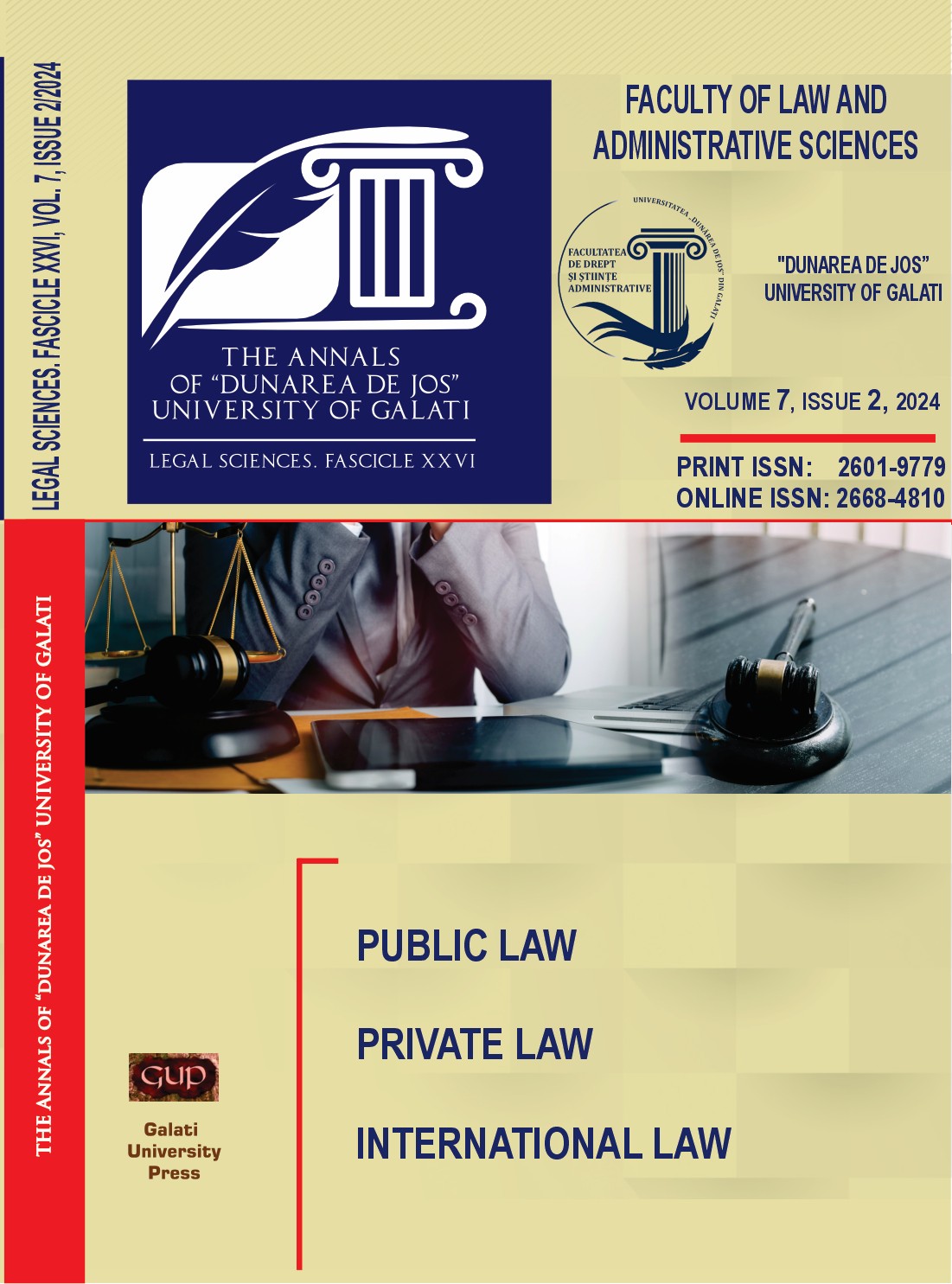The Phenomenon of Drugs from Legislative Perspective
Abstract
The complex social and health scourge of illegal drugs affects millions of people globally, with enormous negative consequences for both users and their families and communities. Drug use generates huge costs and harms to public health and safety, the environment and labor productivity, it brings with it threats to security, related to violence, crime and corruption; the illicit drug market is one of the main sources of income for organized crime groups, and drug trafficking affects stability and governance. Romanian legislation in the field underwent a significant change through the promulgation of Law 58/2024, which supplements Law 43/2000 and amends Law 194/2011, eliminating the possibility of serving the sentence under supervision in the case of cultivation, offering, sale, transport, purchase and possession of drugs . of high risk and international high-risk drug trafficking, as well as increasing the amount of punishments, in the sense that carrying out operations with products likely to have psychoactive effects constitutes a crime and this is punishable by imprisonment from three to 10 years. In order to combat drug-related crime, Romania seeks to strengthen security means by preventing, deterring and disrupting drug-related crime, through judicial cooperation and in the field of ensuring compliance with the law, operative data, interdiction, confiscation of assets derived from the commission of crimes, investigation and of crimes. border management. This punitive strategy is in dissonance with the new policy of the European Union, promoting public health and controlled legalization of drugs, practically proving that the strategy based on the fight against drugs has failed, exponentially increasing their consumption. The adoption of this philosophy of public health is an international constant, but also an urgent necessity for Romania, which acts as a responsible state, where the health - and not the punishment - of the consumer comes first.
References
Alonso, F. 2015. Synthetic Drugs: Prohibition's Latest Creation, Georgetown: O'Neill Institute for National & Global Health Law.
Benfer et al., 2018. The Impact of Drug Policy Liberalization on Willingness to Seek Help for Problem Drug Use: A Comparison of 20 Countries. In: "International Journal of Drug Policy", no. 56 (1), pp. 162-175.
Council of the European Union. EU Drugs Strategy 2021-2025, Available at: https://www. consilium.europa.eu/ro/policies/eu-drugs-policy/.
Coomber, R., Moyle, L., South, N., The Normalization of Drug Supply: The Social Supply of Drugs as the 'Other Side' of the History of Normalisation. In: "Drugs: Education, Prevention and Policy", 2016, no. 23 (3), pp. 255-263.
Copăceanu, M. Sex, alcohol, marijuana and depression among young people in Romania. 2020. Bucharest: University Ed., 2020. 322 p.
Directorate for the Investigation of Organized Crime and Terrorism, Activity Report 2023. Bucharest, 2024. Available at: https://www.diicot. ro/images/documents/rapoarte_activatie/ raport_2023.pdf
Eastwood, N., Fox, E., Rosmarin, A., 2016. A Quiet Revolution: Drug Decriminalization Across the Globe, London: Release.
EMCDDA, 2017. European Drug Report, Available at: https://www. emcdda.europa.eu/ system/files/publications/4541/TDAT17001RON.pdf
Eurasian Harm Reduction Agency, 2020. Criminalization costs 2 – Romania, Available at: https://harmreductioneurasia.org/drug-policy/ criminalization-costs-2/romania.
European Monitoring Center for Drugs and Drug Addiction. European Drug Report 2023: Trends and Developments (2023). Available at: https:// www.emcdda. europa.eu/publications/european-drug-report/2023/ cannabis_en
Global Commission on Drug Policy (GCDP), 2018. Regulation: The Responsible Control of Drugs, Geneva: Global Commission on Drug Policy.
Godlee, F., 2018. Drugs Should be Legalised, Regulated, and Taxed, London: The British Medicine Journal.
MAI (Ministry of Internal Affairs), National Strategy in the Field of Drugs, 2022-2026, 2022. Available at: https://sgg.gov.ro/1/wp-content/ uploads/2022/03/ANEXA-1-15 .pdf.
Nutt, D., 2023. No Laughing Matter: The Nonsense Plan for Placing Nitrous Oxide in the MD Act 1971. In: "Drug Science, Policy and Law", 2023, no. 9 (1), DOI: 10.1177/ 20503245231170039.
Olaru A., 2022. DIICOT does not support the tightening of penalties for drug users in Romania. PressOne, August 7, 2022, Available at: https://pressone.ro/diicot-nu-sustine-inasprireapedepselor-pentru-consumatorii-de-droguri-din-romania/.
Pennay, A.E. and Measham, F.C., 2016. The Normalization Thesis – 20 Years Later. In: "Drugs: Education, Prevention and Policy", 2016, no. 23 (3), pp. 187-189.
Royal Society for Public Health, Taking a New Line on Drugs, 2016. Available at: https://www. rsph.org.uk/static/ uploaded/68d93cdc-292c-4a7b-babfc0a8ee252bc0.pdf.
United Nations Human Rights Office of the High Commissioner. UN experts call for end to global 'war on drugs', 2023. Available at: https:// www.ohchr.org/en/press-releases/2023/06/un-experts-call-end-global-war- drugs
UNODC, Market Analysis of Plant-Based Drugs, World Drug Report 2017, Booklet 3, 2017. Available at: https://www.unodc.org/wdr2017/field/ Booklet_3_Plantbased_drugs.pdf.
Zaha V. G., Dumitru A., Militaru C. A., Public anti-drug policies in Romania: Between criminal justice and public health, 2023. Available at: https://library.fes. de/pdf-files/bueros/bucarest/20633.pdf
Law no. 58 of March 20, 2024 to supplement Law no. 143/2000 on the prevention and combating of illicit drug trafficking and consumption, to amend Law no. 194/2011 regarding the combating of operations with products likely to have psychoactive effects, other than those provided by the normative acts in force, as well as for completing art. 91 para. (3) from Law no. 286/2009 regarding the Criminal Code. In: Monitorul Oficial al României, 21.03.2024, no. 243.

This work is licensed under a Creative Commons Attribution 4.0 International License.
The author fully assumes the content's originality and the holograph signature makes him responsible in case of trial.


